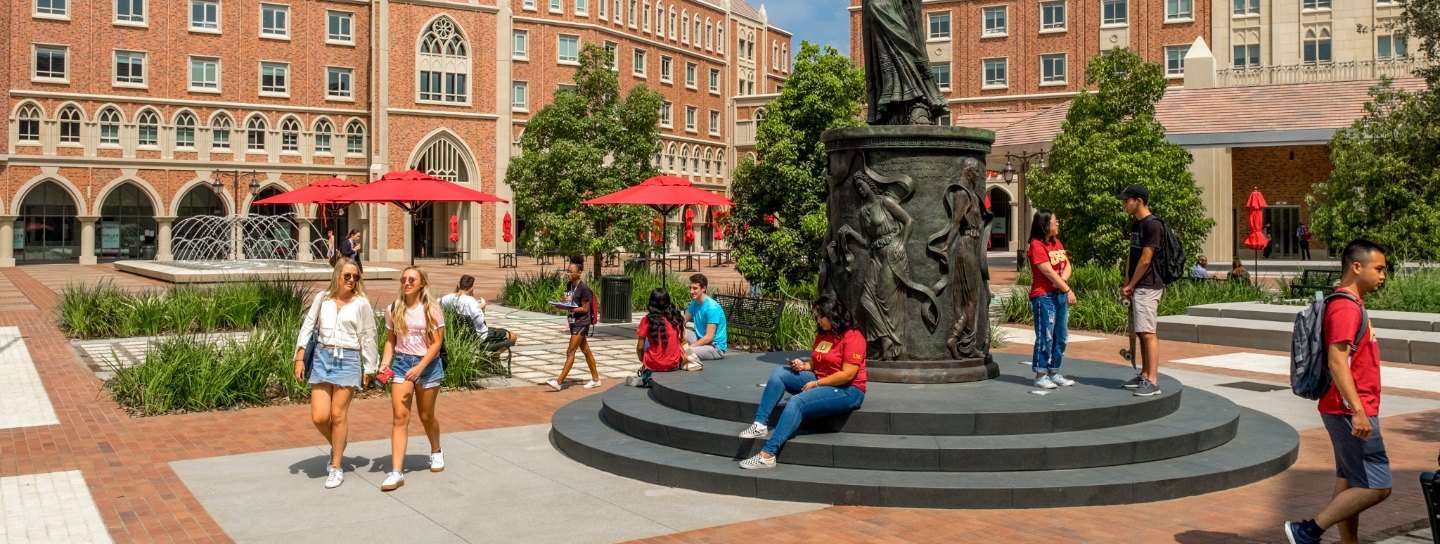
USC Master of Social Work
We See Solutions
Society is changing more rapidly than ever, creating dynamic and complex challenges that require us to develop integrative practice methods to empower students and the field. Where others only see the problems, our curriculum helps our students see solutions. It revolves around experiential, practice and competency-based learning, and culturally-responsive training all informed by evidence and best practices. From the classroom to the field, the USC-SDP MSW experience will stretch, grow and broaden our students' perspective and practice — positioning our graduates to create lasting social change.
Ready to Make a Difference?
Social workers make a real difference, driving change at a policy level, within an organization, or by working with individuals one-on-one.
USC's Master of Social Work will empower you to pursue bold, compassionate solutions to complex social challenges. Our program will prepare you to enter the workforce and immediately engage with the issues that matter most to you.
Frequently Asked Questions
Why should I pursue a master’s degree in social work?
If you care about changing the world for the better, a degree in social work will give you the skills and experience to make a real difference in the lives of individuals and society as a whole.
The MSW prepares you for a wide variety of career paths — in public, private and nonprofit sectors — and the flexibility and expertise to move from one setting, population and organization to another with ease.
What are the admissions requirements?
Admissions requirements vary based on whether or not you're applying for advanced standing. In general, though, we require:
- Bachelor’s degree from a regionally accredited college or university, or foreign equivalent, with a minimum of 18 units of interdisciplinary liberal arts coursework, spanning both social and biological sciences
- Strong academic promise to perform successfully at the graduate level; typically evidenced by a minimum cumulative undergraduate GPA of 3.0 (based on a 4.0 grading scale)
- Experience in providing service to people preferred, such as 1-2 years of social work-related or volunteer experience preferred
How long will it take to earn my MSW degree?
The MSW was designed to be accessible and flexible in order to meet the needs of students who want a full-time program or those who are simultaneously working or have other responsibilities and are looking for more of a part-time option. In-person, online or hybrid (first-year in-person and second-year online) exist in full-time and part-time options.
Accelerated
12 MonthsStudents who previously earned a Bachelor’s Degree in Social Work from an accredited university may be eligible to complete their MSW in 12 months. Perfect for career-changers who want to go back to school full-time to get back in the workforce as quickly as possible.
Full-Time
24 MonthsPerfect for career changers or recent graduates that have some exposure to social work practice and have the time to engage in an immersive educational program on campus or online.
Part-Time
28 Months to 4 YearsPerfect for working professionals who need to work around a day job while pursuing their master’s degree.
Online
VariablePerfect for students who live further away or cannot get to campus regularly.
What orientation activities does the school provide for new students?
We require all new students to attend orientation sessions that introduce you to campus resources, support services, curriculum, financial aid, field instruction and technology. An international student adviser also is available to help foreign students become oriented to the school.
Is student housing available?
Yes. Graduate student housing is offered to graduate students in LA at the University Park Campus. USC Housing Services offers a wide variety of housing options for graduate students, from residence halls to apartments. Most MSW students do not live in university housing since the Los Angeles area has numerous interesting communities in which to live, many within a reasonable commuting distance from USC. If you decide to apply for housing, we recommend that you meet the Priority Deadline for the MSW program so that you can receive your admission decision as early as possible — housing applications may only be submitted once you have been admitted to USC.
When does the semester start?
The best resource for all dates is the university's academic calendar.

Throughout your time in the program, your critical thinking and problem-solving skills as well as your empathy will be honed in effectively address the interconnected needs of individuals, families, and communities. Our MSW program integrates advanced practice with cutting-edge research and best practices, equipping you with the skills to provide effective support, address complex societal challenges, and lead transformative change in communities around the world.
Get More Details
MSW Formats
Our MSW program offers on campus, online and hybrid learning options to accommodate student preferences. On-campus learning provides synchronous learning, immediate feedback, and access to campus resources. Online learning offers flexibility, asynchronous and synchronous learning, and diverse interactions. Hybrid learning combines the best of both, providing structured in-person courses in the first year and flexible online courses in the second year, ensuring a balanced and varied learning experience. Each format is designed to cater to different learning styles and life circumstances, ensuring that all students can achieve their educational goals effectively.
Which One Is Right for You?
On Campus
- Learn face-to-face with peers and renowned faculty
- Synchronous learning
- Full- and part-time options
- Day and evening classes
- Advanced Standing available
Hybrid
- Flexible format to earn your degree
- First year on campus, second year online
- Full- and part-time options
- Day, evening and weekend classes
- Advanced Standing available

Our dynamic, supportive academic environment makes space for you to think deeply, act courageously and explore new ways to create meaningful change.